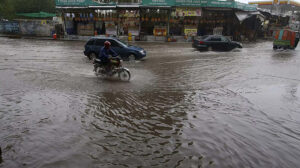Pakistan Faces Climate Crisis: ‘Wettest April in Over 60 Years’ Raises Alarm”
Pakistan has been grappling with a climate crisis as it witnessed its “wettest April since 1961,” according to the latest report from the country’s meteorological department. The unprecedented rainfall, more than double the usual amount for the month, has sparked concerns about the country’s vulnerability to extreme weather events and the urgent need for climate action.
With rainfall reaching 59.3 millimeters, significantly above the normal average of 22.5 millimeters, Pakistan has experienced widespread devastation, including thunderstorms, house collapses, and tragic loss of life. At least 144 deaths were reported, with the highest toll recorded in northwestern Khyber Pakhtunkhwa, where 84 people lost their lives, including 38 children.
The impact of the heavy rains extends beyond human casualties, as millions of people have been affected, with thousands of homes damaged and extensive losses incurred in the agricultural sector. The destruction of crops, particularly the wheat harvest in Punjab, has exacerbated the economic challenges facing the country, already grappling with an economic crisis.
While the world is witnessing a surge in temperatures due to heatwaves, Pakistan’s national monthly temperature for April was unexpectedly lower than average, highlighting the unpredictable nature of climate patterns. Despite being responsible for less than one percent of global greenhouse gas emissions, Pakistan is highly susceptible to the adverse effects of climate change, exacerbated by global warming.
The situation calls for urgent action from both local and global stakeholders to address the root causes of climate change and enhance resilience against its impacts. The United Nations has emphasized the need for immediate measures to protect vulnerable populations, particularly children, who are disproportionately affected by climate-related disasters.
As Pakistan continues to grapple with the aftermath of its wettest April in over 60 years, the pressing need for climate adaptation and mitigation measures cannot be overstated. The events serve as a stark reminder of the imperative to prioritize climate resilience and sustainability in national policies and international agendas. Failure to act decisively risks further exacerbating the humanitarian and economic challenges facing the country in the face of a changing climate.


![Mumtaz Zahra Baloch, spokesperson for Pakistan's Foreign Ministry, says the country believes in constructive dialogue with the US [Courtesy of Pakistan Ministry of Foreign Affairs]](https://southasiancorrespondent.com/wp-content/uploads/2024/06/pak-1-390x220.jpg)


